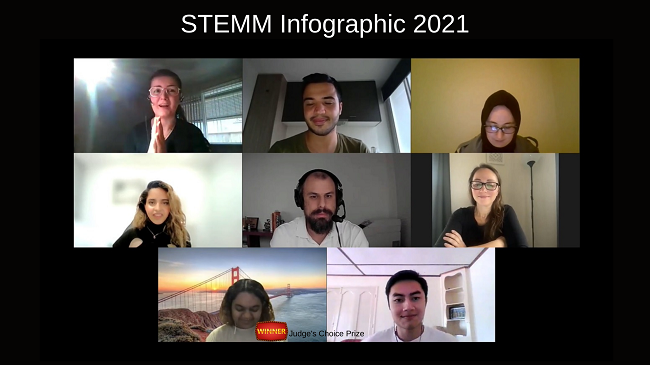KUCHING – Six Swinburne University of Technology Sarawak Campus Biotechnology students, Celestina Jillian-Mae Gtiumiss, Kavinda Juliyan Gunasinghe, Jonathan Lee Wen Han, Muhammad Iqbal bin Abu Talib, Alwi Nurmadi Widyananda and Kirthanaa Sakthi A/P Nagulan, were selected as finalists for two Science Communication competitions – Start Talking and STEMM Infographic – held on 14 and 28 October 2021.
The Start Talking and STEMM Infographic competitions are Science, Technology, Engineering, Mathematics and Medicine (STEMM) public speaking competitions organised by the School of Science, Computing and Engineering Technologies, Swinburne Melbourne, and open to all Swinburne students.
Participants were supported with five workshops – ‘Professional Networking with Confidence’, ‘Women in STEM Networking’, ‘Storytelling Video by Adobe Rush’, ‘STEMM Infographic: Adobe Illustrator’ and ‘STEMM Infographic: Data Visualisation’ – conducted in August and September. Swinburne Sarawak participants were also mentored by Dr Irine Runnie Ginjom (School of Chemical Engineering and Science, Swinburne Sarawak) as part of NPS20005 Communication for Scientists activities.
The competitions were judged by a panel of prominent scientists, communicators and industry representatives, namely Alan Duffy (Director of the Space Technology and Industry Institute), Associate Professor Clare Dyson (Digital Literacies, Swinburne), Virginia Kilborn (Swinburne Chief Scientist), Jean Oi (Insurance Australia Group, IAG), Mike Flattley (CEO, The Royal Society of Victoria), Stephanie Stevenson (IAG) and Peter Marcato (Media and Communications, Swinburne).
Celestina won the People’s Choice Prize for the Start Talking competition with her presentation entitled ‘Malaysia, Electricity and the Ocean’ while Alwi and Kirtahanaa’s team emerged as the Judge’s Choice Prize for the STEMM Infographic competition with their video entitled ‘This Bacteria Wants to Eat Your Plastic’. Both the winning individual and team respectively bagged $100 and $400 prize money. Their achievements were a testimony that our students are among the top science communicators among their peers in both Swinburne campuses.
Science communication is part of a scientist’s everyday life. Scientists must give talks, write papers and proposals, communicate with a variety of audiences and educate others. Thus, to be successful, regardless of field or career path, scientists must learn how to communicate.
In the NPS20005 Communication for Scientists unit, students have the opportunity to enhance their employability by developing their skills to use appropriate communication channels and technology to effectively communicate scientific information to a broad range of audiences. In addition, the teaching and learning activities are geared to promote Adobe Creative Campus and graduate employability skills through Academic Innovation and Change initiatives.

Participants of STEMM Infographic 2021.


